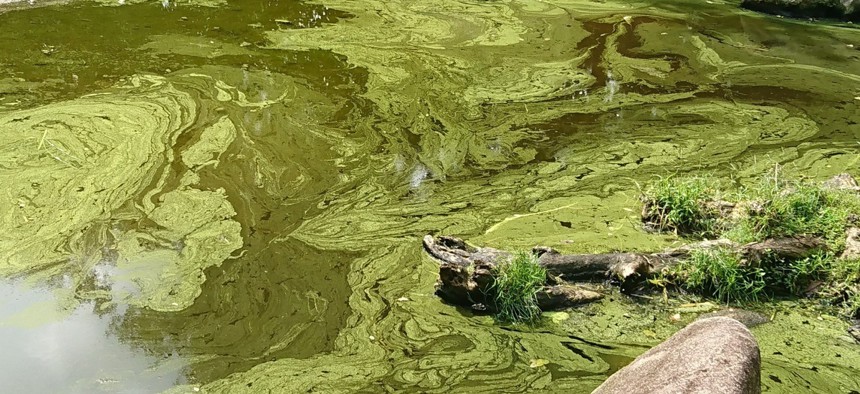Connecting state and local government leaders
Blue-green algae blooms have been reported in dozens of states and municipalities, shutting beaches and putting people and animals at risk.
On a Thursday at the beginning of August, Melissa Martin took her three dogs to play at a pond in Wilmington, North Carolina. Two of the pups stayed on the shore, but the third splashed around in the water.
At home later, all three dogs began having seizures. Martin took them to the vet, who said nothing could be done. All three were dead within hours. After consulting with poison control officials, Martin’s veterinarian confirmed that the dogs had been poisoned by cyanobacteria, more commonly referred to as blue-green algae.
"At 12:08 a.m., our dogs crossed the rainbow bridge together," Martin wrote on Facebook in a post that went viral. "They contracted blue-green algae poisoning and there was nothing they could do. We are gutted. I wish I could do today over. I would give anything to have one more day with them."
Blue-green algae are commonly present in freshwater systems, and many types aren’t toxic. But under the right conditions—hot temperatures, stagnant water and an abundance of nitrogen and phosphorous, the primary ingredients in most commercial fertilizers—they multiply rapidly, causing “bloom” conditions that can include the production of toxins called microcystins. Microcystins affect the liver, kidneys and nervous system, with effects ranging from an upset stomach to seizures and death. Children and dogs are particularly vulnerable.
Jan Stevenson, a professor of algal ecology, aquatic ecology and environmental science at Michigan State University, said that people exposed to blue-green algae have required "intensive hospital care," though there are no estimates of the number of people affected worldwide. “It’s a major concern with drinking water supplies, and if animals or pets swim in these waters and drink too much of it, they can die," he said.
Blue-green algae blooms happen most often in the summer and are currently present in dozens of cities and states nationwide. All 21 of Mississippi’s beaches are under water contact warnings due to prolific algae blooms. Blue-green algae has been spotted or is expected to pop up in 14 lakes in Kansas and in six lakes in Colorado. Dog deaths from algae exposure have been reported in at least four states, including Texas, where four dogs died after swimming in Lady Bird Lake in downtown Austin. Subsequent testing there confirmed the presence of blue-green algae, the first time any water body in the city has ever tested positive for the bacteria.
“The most common place we found it was an island kind of in the middle of Lady Bird Lake, so we closed that island to the public,” said Bryce Bencivengo, a spokesman for the city of Austin. “Now, as we’re getting the full testing back, we’ve started to reach out to other municipalities and agencies that have done testing on this and have had this issue longer than we have to learn more about what our options are. At this point we have not heard of an effective treatment.”
Despite their ubiquity and their ability to wreak havoc, algae blooms in general are not well-studied, Stevenson said. But scientists broadly agree that climate change is exacerbating the problem.
"We’re getting warmer summers for a longer period of time, so not only is the summer hotter, but we reach the temperatures that cyanobacteria will grow earlier in the season and they last longer," he said. "I'd say we are certain that cyanobacteria blooms are becoming more intense and more frequent over time. There’s just no question about that, really."
State and local agencies can tackle algae blooms in drinking water supplies by filtering the water, Stevenson said, but there’s less that can be done for tainted recreational bodies of water, including beaches and lakes.
Municipalities typically respond defensively to those cases by closing affected bodies of water, warning members of the public of the risk of exposure and waiting for the bloom to fade naturally, which happens when cooler temperatures prevail or the algae run out of food sources. Some places, including Austin, have stepped up water monitoring efforts to stay on top of algae proliferation. In Florida, where blooms have plagued Lake Okeechobee, officials have increased water monitoring in an attempt to pinpoint where nutrients are entering the watershed. That data will be shared with the state’s environment and agriculture agencies to help develop a comprehensive plan for clean-up and prevention.
“We’re getting more monitoring sites established so we have greater coverage, and we’re also increasing the frequency in which we monitor,” said Lawrence Glenn, director of water resources for the South Florida Water Management District. “It will allow us to provide better data to streamline our efforts and find spots that have more nutrient input than others, so we’ll know where to focus our efforts collectively.”
There are some proactive measures that governments can take to reduce the risk of algal blooms, most notably by limiting the amount of fertilizer that’s applied to agricultural crops and fields and installing mitigation measures, including buffer strips. But few places have taken those steps on a large scale, Stevenson said.
“The solution to this problem is kind of similar to climate change,” he said. “We can generate an economy around this change we need to make that would benefit everyone—we just need the political will to do it.”
Until that happens, algae blooms are likely to increase in frequency, a side effect of increasingly warming temperatures and the pressure on the agricultural industry to feed larger numbers of people.
“Climate change is getting worse and we have to feed more people on the planet, and that’s going to require more nitrogen and phosphorous,” Stevenson said. “If we don’t do anything about it as a society, they’ll get worse."
Kate Elizabeth Queram is a Staff Correspondent for Route Fifty and is based in Washington, D.C.

NEXT STORY: Trailer Park Near Posh Ski Resort Part of Statewide Mobile Home Debate



